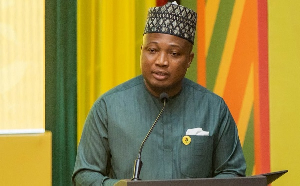By Kofi Ata, Cambridge, UK
My article entitled “Why has Nana Akufo Addo omitted Oxford University from his Profile?” received a number of comments from readers (see Modernghana.com, November11,2102) http://www.modernghana.com/newsthread1/429126/1/188287#showcomments2
and Ghanaweb November 13,2012. http://www.ghanaweb.com/GhanaHomePage/NewsArchive/artikel.php?ID=256160
Though I read all the comments, I refrained from responding to a number questions posed by readers as I usually do. Instead, I decided to respond to them in a follow up article.
Before I do so, I want to take this opportunity to clarify some misconceptions that the article generated. Some readers asked if I had never failed an examination. I want to put on record that I have no evidence that Nana Akufo Addo failed his exams at Oxford and I did not state anywhere in my aforementioned article that he failed his exams. In fact, I am yet to find out why Nana Akufo Addo left or disappeared from Oxford University without completing his studies.
I also wish to put on record that, by making public the outcome of my Freedom of Information Request to Oxford University regarding the controversy over whether Nana Akufo Addo went to Oxford or not, I was not in any way suggesting that because he did not complete his studies at Oxford, Nana Akufo Addo is not fit to be President of Ghana. As some readers said in their comments and I agree with them, one does not need to be a graduate to be president, let alone successfully complete a course at Oxford. To me, for the then 18 or 19 year old Akufo Addo to gain admission into Oxford was an achievement in itself. I therefore find it sad that, he and those around him would want to deny something that is commendable.
In fact, even if Nana Akufo Addo failed his exams, was dismissed or he left on his own accord that should not preclude him from becoming President of Ghana. I hold this view not only because he was only 18 or 19 years of age at the time but has since become of age and matured into a formidable and successful politician. However, my concern was the way and manner that the NPP Presidential candidate and those around him have handled the matter so far.
Other readers accused me of being envious of Nana Akufo Addo and intended to damage him by putting facts in the public domain. I am afraid that I do not share this view. The truth may hurt but it also sets us free and in my view, my article has killed those rumours once and for all, which could benefit him. I do not envy Nana Akufo Addo for a number of reasons. I am not seeking elected political office in Ghana and therefore not in competition with him. In fact, I am not in Nana Akufo Addo’s class and may not even be fit to wash his feet, if I were an apostle of his party (considering his long life achievements). Though if I had a vote, I would not vote for him, I must confess that, I admire his achievements.
Others questioned how much I was paid by the NDC to write the article. I can assure those who are of the view that I am paid to post articles that, I am not paid by any individual, group of individuals or political parties in or outside Ghana. I write articles as a hobby and a contribution to development in Ghana. Though I know some leading members of the NDC through my past, I do not shy away from criticising them in my articles when circumstances demand. Indeed, most of my former colleagues in Ghana consider my articles to be anti-NDC. I take pride in the fact that both NPP and NDC members, supporters and sympathisers accuse me of writing against them or being paid by their opponents to write against them. Perhaps, this could be a testimony of my objectivity, impartiality and fairness in my articles.
Some also claimed that since Nana Akufo Addo spent only a year at Oxford or did not complete his studies, there is nothing wrong with him not mentioning it. They are absolutely right. However, he cannot and must not deny the fact that he went to Oxford University even if it was for a very short period. That is where I differ from some readers because for Nana Akufo Addo and those around him to deny that means they are lying and if that is the case, are they trust worthy? In fact, I myself attended Cape Coast University for just a term and do not include that on my CV. However, I will never deny that fact if I were asked the question whether I ever attended Cape Coast University. Even if the university does not have any records on my admission and attendance, I had course and hall mates who are still alive in Ghana and could testify to the fact that I was once a student there.
My objectives for making known to Ghanaians readers what was already in the public domain (through public records at Oxford University) were fourfold. First and foremost, to put to rest the ongoing controversy by confirming beyond any reasonable doubt that, Nana Akufo Addo was a student at Oxford University. Indeed, he applied to and was admitted into, registered and attended Oxford for the 1962/63 academic year. Second, to indicate that the apparent denial or silence over the issue was neither not in the best interest of Nana Akufo Addo nor NPP; third, to raise the important question of “trust” in Ghanaian political discourse and last but certainly not the least, to show NDC and NPP fundamentalists who perpetrate falsehood on the electronic media through baseless allegations against their political opponents that, there is a better way of educating and informing the reading public when it comes to the past and future of Ghanaian politicians. There is no need to fabricate stories and attribute such libelous and defamatory claims to credible organisations just to make them appear as facts. Such people discredit themselves, their objectives and abuse the opportunity of citizen journalism offered by the internet and the electronic media.
Now let me return to the main objective of this article, that is, the question of trust. In today’s society of “get rich quick”, trust has become a very scarce commodity, especially in the political arena. Trust in politics and with politicians across the globe has been eroded to the lowest ebb. With corruption at its apex in Ghana and all parties and political leaders promising to fight the cancer of corruption in the body politic in Ghana, one expects that the Presidential candidate of the main opposition party, who is seeking to replace the incumbent President or caretaker President would have been candid and honest with Ghanaians by gaining the trust of the electorate. Unfortunately, there are too many questions left unanswered about the past of Nana Akufo Addo. These questions though may appear irrelevant to his effectiveness or otherwise for the high office he is seeking, they could damage his credibility and the trust of those who matter most, the electorate.
Psychologists say that, trust is believing that the person who is trusted will do what is expected such as being honest and telling the truth. Trust is integral to the idea of social and political influence and it is easier to influence or persuade someone who is trusting. The notion of trust is increasingly adopted to predict acceptance of behaviours by others and institutions. Perception of honesty, competence and value similarity are very essential in leadership, particularly in politics. It is therefore critical that Ghanaian politicians, including Nana Akufo Addo who are seeking the trust and confidence of the Ghanaian electorate show that they can be trusted when given the mandate.
Nana Akufo Addo has promised honest, transparent and accountable government if elected. How can Ghanaians trust him if he cannot be honest, transparent and accountable about his own past?
According to J A Colquitt and others, there are three different forms of trust. Trust is being vulnerable to someone even when they are trustworthy; Trustworthiness is the characteristics or behaviours of one person that inspire positive expectations in another person, and trust propensity being able to rely on people. Once trust is lost, by obvious violation of one of these three determinants, it is very hard to regain it. Thus, there is clear asymmetry in the building versus destruction of trust. Hence being and acting trustworthy should be considered the only sure way to maintain a trust level. For these reasons, Nana Akufo Addo has everything to lose by been seen as having lost trust amongst the Ghanaian public, especially, the electorate.
I accept that the question of trust in Ghanaian politics does not pertain to Nana Akufo Addo alone but across board. For example, how can Ghanaians trust a President who has cheated on his wife not once but many by having children with other women when still married to his wife? On the other hand, and for Nana Akufo Addo, it is the manner in which he and his cohorts have dealt with the Oxford question that cuts a slur on his integrity. The attempt to deny or ignore the question and to create the impression that Nana Akufo Addo was never a student at Oxford, is dishonestly fraudulent at the highest level. It also puts into serious doubt the judgment of Nana Akufo Addo himself and his advisers who would be running Ghana should he win the December Presidential elections.
When other political leaders have been faced with similar difficult questions that border on their past and trust, they have shown courage and honesty by facing their accusers squarely and admitted to their past mistakes even if they claimed, they only smoked but did not inhale. By being courageous and honest, they showed that they are not super humans but as human and as fallible as the rest of us. Through their actions they exhibited that though they made mistakes in the past, the assurance in their courage and honesty is that when it comes to difficult issues in the future, the electorate can trust them to be honest with them. Can Nana Akufo Addo look at Ghanaians in the eye and say the same, when he is even unable to come clean on an issue that is already in the public domain? It is not shameful to drop out of Oxford or university and instead of Nana Akufo Addo being ashamed of his short period as a student at Oxford, he should be proud of it and own up to it because that would not stop Ghanaians from electing him as their President, if he is the people’s choice.
Kofi Ata, Cambridge
Opinions of Sunday, 18 November 2012
Columnist: Ata, Kofi














